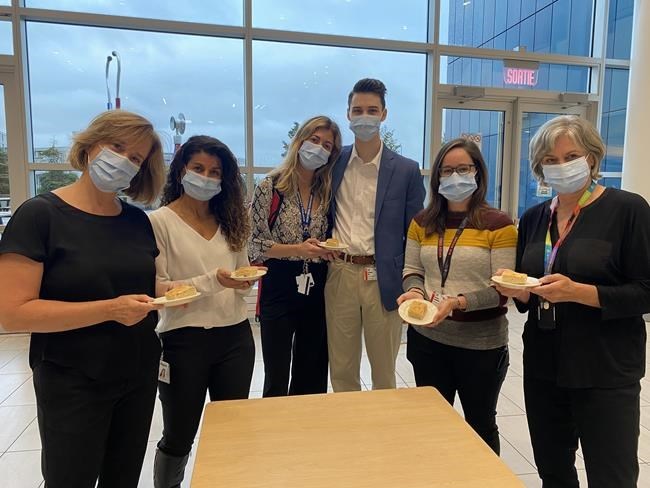MONTREAL — An experience with a patient who wouldn't eat because the meals reminded him of residential school has prompted a Montreal hospital to start offering bannock bread to its Indigenous patients.
Julie Woodfine, a psychiatry liaison nurse at the McGill University Health Centre, said the idea was sparked after a 69-year-old Cree patient from Chisasibi was hospitalized after undergoing cancer surgery. ¬Ý
“I worked several years up north," Woodfine said in an interview this week. "I’m somewhat familiar with the First Nations and Inuit diet. And I knew that bannock was a very important part of their diet. It’s their traditional bread, and it’s also a comforting type of food.”
Dr. Marie-Jos√©e Brouillette, a psychiatrist at the hospital, said patient George Matches informed hospital staff last fall that he was refusing to eat because the food at the hospital brought back memories of residential school. ¬Ý
“We felt awful. I didn’t know that food could be such a loaded issue,” said Brouillette. “And that, in fact, just by trying to feed a patient, it creates an experience that reminds them of a trauma."
Woodfine said that before approaching the hospital with her idea of including traditional food for Indigenous patients, she consulted with the hospital's Indigenous interpreters to get their input.
Next, Woodfine contacted Maryse Fournier, the manager of food services at the hospital, to devise the ideal recipe for the patients. ¬Ý
‚ÄúWe reached out to our partners, and they were super nice. They shared some recipes. We also reached out to the Thunder Bay Regional Health Centre in Ontario, where they have already added the bannock to offer to their patients. But we are the first hospital in Quebec to do it,‚Äù Fournier said in an interview. ¬Ý
The food services team pored over 10 recipes, analyzing the ingredients, dietary restrictions, the equipment needed to make the bread and the feasibility of integrating bannock in a large kitchen production setting. ¬Ý
“We organized taste panels. We were lucky to have some First Nations interpreters .... We had some psychiatrists who joined also. We all tested the recipes, and we all liked them,” Fournier said.
Most Indigenous communities in Canada have a version of bannock. For example, the Inuit call it palauga, while the Mi’kmaq know it as luskinikn. For now, the bannock is made only twice a week, and hospital staff are prioritizing the bread for Indigenous patients.
Nakuset, the founder of Resilience Montreal, a non-profit day shelter serving First Nations communities in Montreal, called the initiative a good first step.
She said many people from Indigenous communities across Quebec come to Montreal for health care, but there are a lot of apprehensions because they worry about discrimination and isolation in the province‚Äôs health system. ¬Ý
“I think that people who have to travel and come to the hospitals here in Montreal, they could be very anxious and worried, and imagine being served bannock," she said. "It is like, wow, that’s really grounding, because it’s something of their culture, and that will turn it into a positive experience.”
Matches died in January. But his four daughters, Elizabeth, Dinah, June and Nancy Matches, told The 91‘≠¥¥ Press by email that they were honoured the hospital started this initiative because of their father.
“We, the daughters of George Matches, would like to thank MUHC for making this possible for the Indigenous people that are hospitalized there to have a little something from home," they said.
This report by The 91‘≠¥¥ Press was first published Oct. 22, 2022.
---Ã˝
This story was produced with the financial assistance of the Meta and 91‘≠¥¥ Press News Fellowship.¬Ý
Marisela Amador, The 91‘≠¥¥ Press



